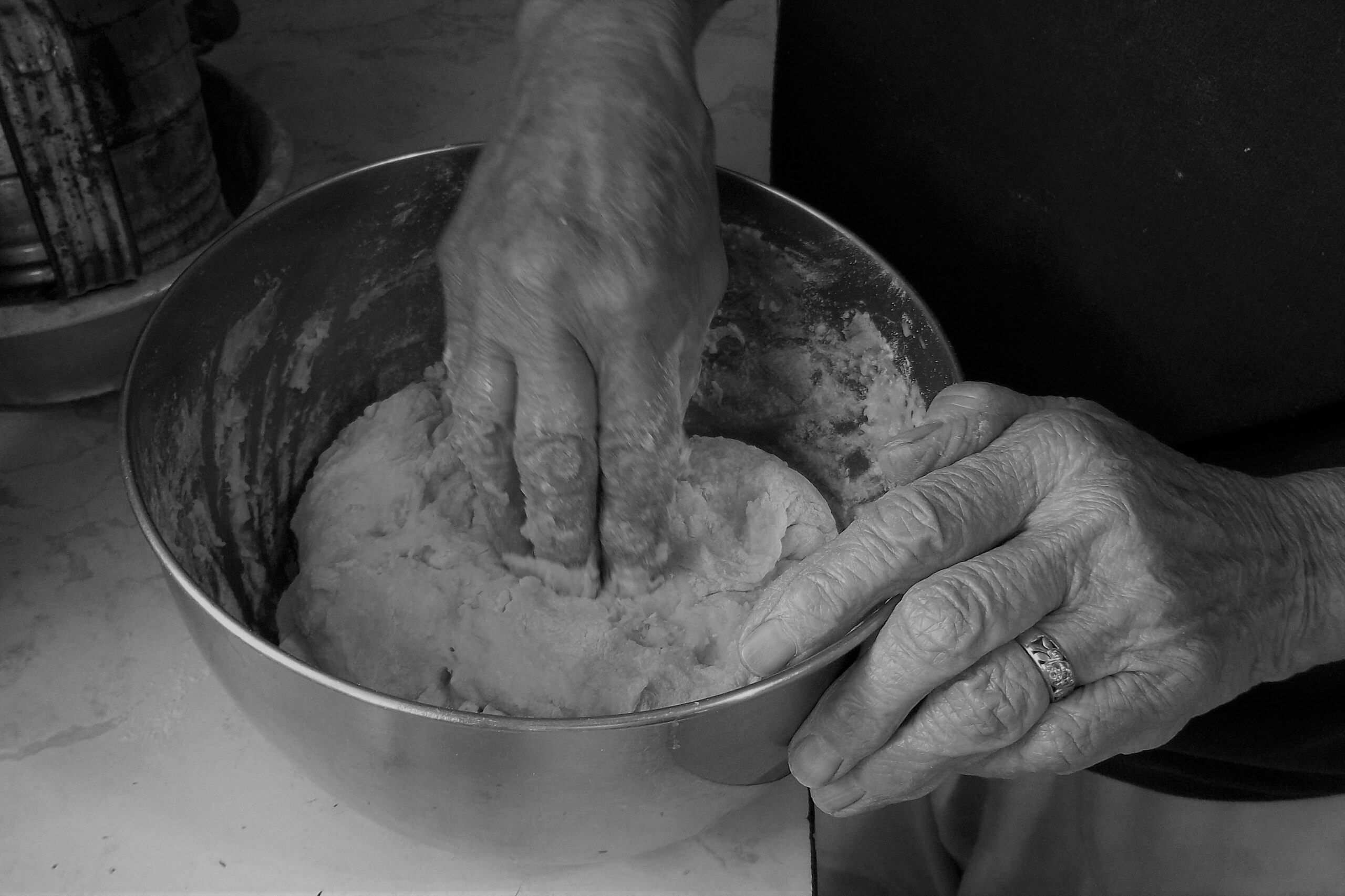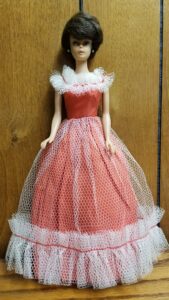Some flour, milk and eggs, and just enough salt “to taste.” In my mom’s hands those baking ingredients meant mouthwatering Blatz Kuchen, Koffee Kuchen, and donuts.


Add a swatch of material to a needle and thread; and in mom’s hands, she could conceal fine running stitches within the seams of a new Christmas dress, a patch to a pair of daddy’s bulky work pants, and tailor-made gowns for a child’s Barbie doll.
She had a green thumb, too. Put a strip of rich dirt in her hands, combine it with seedlings, some water, and weeding — definitely, weeding, and she would have a garden brimming with rows of juicy, plump tomatoes, sweet corn, and a kaleidoscope of Irises, Poppies, and Hollyhocks.



What is that in your hand?
In the Old Testament book of Exodus, we read of Moses, a Hebrew born to slaves. He was raised and educated during his first 40 years in the household of Egypt’s Pharaoh. Through a series of events and poor decisions, however, Moses ends up fleeing from Egypt. Looking to put his past behind him, he settles down in Midian and becomes a shepherd (Exodus 2). But then God comes. God has something different for Moses.
After 40 years in Midian, God calls to Moses in a burning bush for his greatest work yet — the immense task of leading the people of Israel out of Egypt (Exodus 3). An assignment that would not be accomplished without leaning hard on the LORD God.
“Who am I that I should go?” “Who are you?” “What if they don’t believe me?” Insecurities swell. Focusing on his inabilities, the excuses begin. Moses even says, “Please send someone else” (Exodus 4:13).
I wonder. It had been about 400 years since any Israelite had heard a word from God. Did God graciously give Moses the signs recorded in Exodus to help boost his faith (vv. 2, 6, 9)?
The ordinary and impotent becomes powerful when yielded in obedience to the Lord.1
“What is that in your hand?” God asks.
In his hand, Moses carried a shepherd’s staff. Used for herding and defending sheep, it reflects the simple existence he had settled for, becoming part of his identity and security.
“Throw it on the ground,” the Lord instructs Moses. When he does, the Lord transforms it into a serpent, a sign of Egyptian power that kings wore on their headdresses. Moses runs from it. The Lord then tells Moses to grab it by its tail. Now, grabbing a snake by the tail is usually not a good idea! But Moses obeys and when he does, it becomes a staff again.
That dry stick shows a lowly shepherd that “the ordinary and impotent becomes powerful when yielded in obedience to the Lord.” In Moses’ hands it is a long, albeit sturdy, stick. Released to God’s masterful hands it becomes a tool to accomplish God’s purposes. As God transforms the staff, He also begins to transform Moses, who will dominate a fearful Egyptian tyrant and lead a people out of slavery. The shepherd’s staff (Exodus 4:2) becomes the “the staff of God” (Exodus 4:20).
You give them something to eat.
Jesus taught this same fundamental lesson to His disciples in the miracle of the feeding of the 5,000; the only miracle recorded in all four of the New Testament Gospels.
After a day of teaching and healing, Jesus and the disciples are tired. “Come with me by yourselves to a quiet place and get some rest,” Jesus commands (Mark 6:30-44). But there is no rest; for in the remote place to which they go, a large crowd finds them. It is here that Jesus gives the impossible command, “You [disciples] give them something to eat” (v.37).
Can’t you just hear the weary disciples. “Seriously? Can’t we just send them away? Even if we could find enough food, we would have to spend a half year’s salary!”
The meeting of need is not dependent on the supply in hand, but on the blessing of the Lord resting on the supply. 2
As God questioned Moses, “What is that in your hand?”, Jesus asks in a similar way, “How many loaves do you have?” (v. 38).
“Only five loaves of bread and two fish” (Luke 9:13). Not anywhere near enough to feed thousands of hungry people; at least in the hands of ordinary men.
But then the Son of God takes the “only” into His hands. Looking up to heaven, Jesus gives thanks and then passes the loaves and fish to His disciples who in turn feed the people. In God’s masterful hands, “They all ate and were satisfied,” with leftovers filling twelve basketfuls (vv. 42-43).
Later those same powerful hands are nailed to a cross on Calvary as the Son of God satisfies the wrath of God, bearing the sins of all people for all time, bringing us peace with God.
Who am I to you? Blog
God created each of us uniquely, male and female; each with our own blend of personality, abilities, passions, and experiences. Sometimes it may seem that what others have in their hands is more grand, of greater importance, or more worthwhile.
My mom wasn’t a top chef or master gardener feeding the masses or an acclaimed seamstress transforming the fashion world. Baking “flops” were a fact. She ripped out many-a stitches, removing unwanted threads. And now that I think about it, she never won a blue ribbon at the county fair for her flowers or her cheese cake, either. In God’s masterful hands, however, what she had in hers served her well as she served her family.
Take my hands and let them move
At the impulse of Thy love;
Take my feet and let them be
Swift and beautiful for Thee.
(Romans 6:13)
Take My Life and Let It Be, Frances R. Havergal, 1874
1 Stephen Cole, Serving God Effectively
2 Watchman Nee, Expecting the Lord’s Blessing